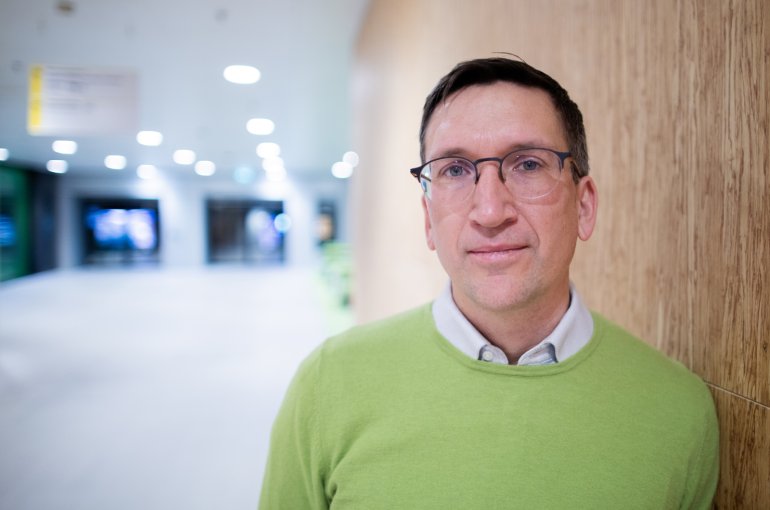Matthieu Verstraete appointed as Professor in Ab Initio Simulations of Quantum Materials
“We predict material properties at the nanoscale – through computer simulations”

Matthieu Verstraete has been appointed as professor in Ab Initio Simulations of Quantum Materials at the Faculty of Science at Utrecht University as of 1 November 2023. The new professor predicts, via computer simulations, how materials behave at the quantum level under specific conditions, such as high temperatures or pressures. "Understanding the mechanism behind a material allows us to discover new things that we didn’t know were possible."
Matthieu Verstraete is on a quest for more sustainable, cost-effective and safer alternatives to existing materials. "Many materials used in technological gadgets such as batteries and phones face issues with electrical conduction, leading to energy loss in the form of heat," he explains. "Furthermore, some materials are toxic, like lead, or sourced through mining under poor ecological or humanitarian conditions."
Quantum materials
Potential candidates for more future-proof materials are quantum materials. These substances behave differently than 'ordinary' materials like wood, plastic, or stone, due to the properties of their smallest constituent particles. Because of these particles' properties, quantum materials can conduct electricity without energy loss or possess super strength or magnetism. Such materials are crucial in areas like the energy transition and the development of new technologies.
Simulations over experiments
Many quantum materials do not yet exist, and their production process is expensive and time-consuming. Additionally, a new material needs testing in a lab to determine its usability for the intended purpose. Verstraete bypasses this costly and time-consuming process by using simulations to predict the properties of new quantum materials.
Simulations let us explore thousands of not-yet-existing materials and extrapolate the five best, without spending millions on experiments.
Verstraete’s research doesn't take place in a lab; there are no experiments involved. He and his team solely use computers. Simulation renders the research more efficient, the professor explains: "By using simulations, we can explore hundreds or even thousands of not-yet-existing materials and extrapolate the five best, without having to invest millions in experiments."
AI as an aid
One of Verstraete's objectives after his appointment as a professor at Utrecht University is to study how materials conduct heat. Some materials insulate well (useful for homes to retain warmth), while others conduct heat excellently (useful in cooling computers to prevent overheating).
Calculating heat conductivity for each material is time-consuming. Verstraete and his team employ machine learning to train a computer program based on a small quantum calculation dataset. “This enables it to predict how atoms move in a given material, and speeds up the process by about a thousand times,” explains Verstraete. "AI is in vogue, but it's also truly efficient when incorporated cleverly into your methods."
Exponential growth
Verstraete hopes for exponential growth in the number of materials capable of storing energy and absorbing CO2. Countless existing materials might be capable of much more than we think, he suspects. These remained undiscovered because the materials were never tested under the right conditions, and simulation methods might unveil their hidden properties. Verstraete: "I'll keep searching for materials that have never been explored, but also for new methods to investigate materials."
About Matthieu
Matthieu Verstraete's interest in quantum physics and materials science sparked early. He studied Engineering Physics in Lausanne, Switzerland, and pursued doctoral research in Materials Science in Belgium. After post-docs in the UK and Spain, in 2009 he became professor in the Department of Physics of the University of Liège (Luik) investigating the electronic structure of materials. At Utrecht University, Verstraete will conduct research at the Institute for Theoretical Physics (ITP) and establish a new research group. He collaborates extensively with institutes across other departments, such as the Debye Institute, as well as other universities nationally and internationally.

